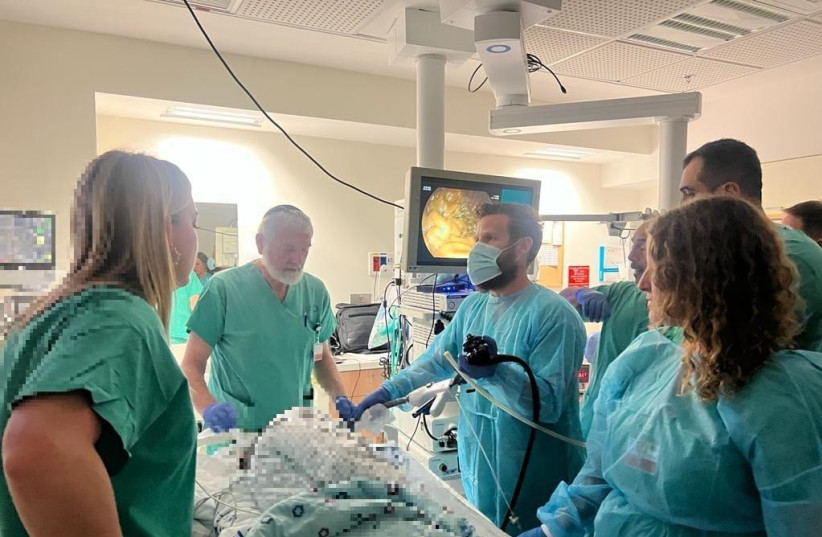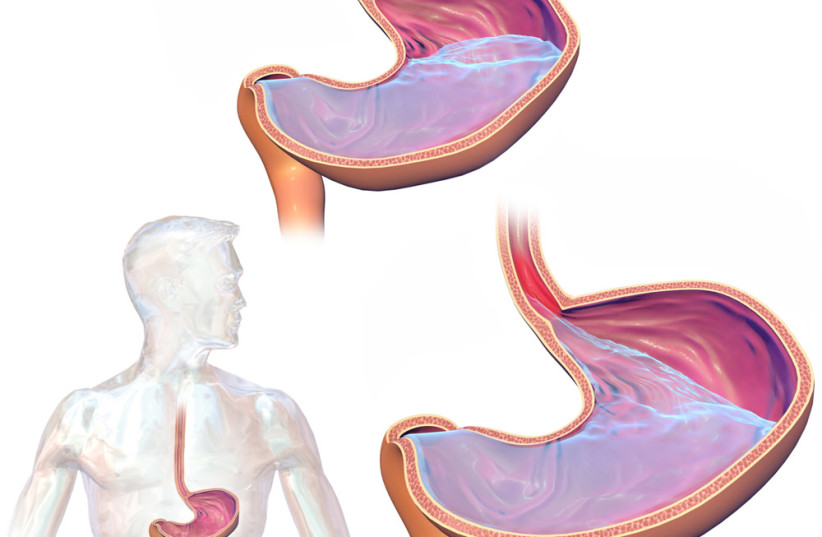Specialists at Jerusalem’s Shaare Zedek Medical Center (SZMC) have performed an innovative endoscopic procedure for the first time in Israel that successfully treats patients suffering from heartburn acid reflux – which can be done instead of surgery.
The safe and innovative treatment, which has been researched and approved by the US Food and Drug Administration (FDA), was recently included in the guidelines for the treatment of reflux by the American College of Gastroenterology.
Acid reflux occurs when the sphincter muscle at the lower end of the esophagus relaxes at the wrong time, allowing stomach acid to go back up into the food tube. This condition can cause heartburn and other signs and symptoms, but when it becomes chronic, it can lead to gastroesophageal reflux disease, in which the acid irritates the lining of the esophagus. People with GERD have a slightly higher risk of getting pre-malignant and even malignant adenocarcinoma of the esophagus.
When lifestyle changes and medications aren't enough
Most are able to manage the discomfort of GERD with lifestyle changes and medications, but some have had to undergo surgery to ease symptoms.

Gastroenterologists from the largest Israeli hospitals watched as Dr. Dan Meir Livovsky, a senior gastroenterologist and endoscopist, and Prof. Eran Goldin, head of the SZMC Digestive Diseases Institute performed the procedure. They were supported by Endogastric Solutions of Redmond, Washington, which developed the innovative treatment, and Medhot, an importer of dental supplies in Israel.
The minimally invasive endoscopic operation called transoral incisionless fundoplication (TIF) reconstructs the valve between the stomach and esophagus. Fundoplication means folding of the fundus, the tissue at the top of the stomach.
By folding the fundus around the opening between the stomach and esophagus, a gastroenterologist reinforces this area to prevent stomach acid from coming up into the muscular food tube. Fundoplication helps create a new barrier to reflux from the stomach. Transoral means the procedure is done through the mouth without any external incisions. TIF can replace open surgery that involves a long recovery, making possible a quick return to routine within 24 hours.
Acid reflux is incredibly common
REFLUX IS one of the most common diseases in the Western world and in Israel, when the main symptom is heartburn. The risk factors for reflux are obesity, smoking and drinking alcohol. In a systematic meta-review of 15 epidemiological studies, the prevalence of reflux disease was found to be 10% to 20% of the West’s population; in Israel, tens of percent of patients suffer from this phenomenon at least once a year.
Livovsky said that two treatments are offered for acid reflux. One is pills that reduce the level of acidity of the liquid that rises from the stomach to the esophagus. Sometimes, however, they cause various side effects that can impair daily functioning. In addition, non-acidic fluid continues to rise, which can cause symptoms and impair the quality of life.
The second treatment is a complex operation in which a surgeon uses the upper part of the stomach around the esophagus to restore the valve that does not work properly and to repair a hernia in the diaphragm if there is one.
There is a group of people who are not sick enough to justify surgery on the one hand and for whom the drug treatment does not provide a satisfactory answer or who are not interested in taking medication for the rest of their life on the other hand. These people therefore continue to suffer from persistent symptoms and side effects.
The new treatment and its advantages
“In the treatment, we perform a reconstruction of the esophageal valve with a normal endoscopy through the mouth without incisions,” Livovsky said. “The treatment takes about an hour and involves hospitalization for a day only, for supervision. The patient can return to work and normal life in a short time. The repair prevents complications, treats symptoms, and can prevent esophageal cancer and the need to take medication for life.”
Of the many endoscopic developments that exist in the world today for the treatment of reflux, TIF is the one that has been studied the most with good results, with 80% of patients who underwent the procedure reporting an improvement in their quality of life after seven or eight years, the gastroenterologist said.

“Thanks to the satisfactory results, this treatment is included in the guidelines for reflux treatment. Since [reflux] is a common phenomenon with a significant impairment in the quality of life of many patients, we decided to bring this method to Israel,” Livovsky said.
“The first patient, M., a 46-year-old Jerusalemite, suffered for over a decade from reflux that led to heartburn, hoarseness and a persistent impairment of his quality of life. M. is completely dependent on antacids, which unfortunately only partially helped,” he said.
“We hope that the treatment will help M. and hundreds of other patients across the country. We are proud to be the first Israeli medical center in Israel to adopt such innovative approaches to improve the quality of life of our patients.”
